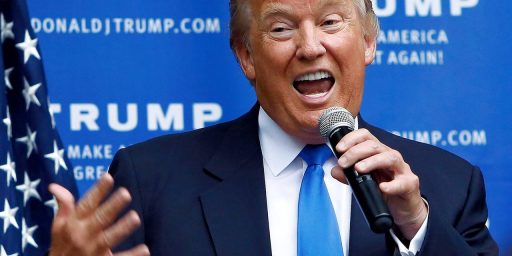About That Cult Thing…
Cults of personality are not the same as cults.

One of the long-standing debates here at Outside The Beltway is whether to treat the MAGA movement as a cult. My answer to that question is a hard “No,” if we mean that, as a social and political organization, the people in red hats waiting outside a stadium to see their Dear Leader resemble the likes of the Branch Davidians, the members of Aum Shunrikyo, the Manson Family, the People’s Temple, or NXIVM. There is one key similarity: a slavish devotion to (in their minds) an infallible, semi-divine leader. Whether that person is Trump, Jim Jones, Kim Il Sung, David Koresh, or Stalin, we confusingly call that passionate credulity a “cult of personality.” However, a cult of personality is not the same thing as a cult.
Cults, as we generally conceive of them, are very inward-looking, self-contained organizations. They seek to create a pocket universe from which it is difficult to escape, in large part because the true believers do not want to leave. The outside world provides temptations, inconvenient facts, and other challenges to unwavering devotion to both the creed and the leader. (The two are symbiotic: the creed grants a charismatic aura to the leader; the leader is the authoritative source of the creed.) Therefore, the cult withdraws from the world, usually under the guise of avoiding the corruptions and disappointments that the rest of humanity create. Removed from any sources of doubt, the members are the cult are willing to ride the cult of personality all the way to destruction.
In contrast, other social forms that may include a cult of personality component are very outward-looking. Their way of dealing with doubt is to overpower and annihilate its sources, not retreat from them. That’s the natural tendency of fascist movements, since their raison d’etre is to force reality to conform with myth, remaking society in the völkisch image of a reclaimed future. Achieving this goal requires the hyper-politicization of everything, because anything that doesn’t conform to the myth is a potential challenge to its core tenets, including the cult of personality around the leader. Cultural icons such as Taylor Swift and Travis Kelce must be vilified, because they might cause even one member of MAGA to feel any doubt about Trump (or the wisdom of not getting vaccinated). Bud Light must be boycotted because, maybe, just maybe a trans person is an unthreatening human being. The re-design of a cartoon Green M&M must be pilloried because it may lead to a questioning of feminine identities and roles. Starbucks cups must be denounced because they might, in the most roundabout way possible, question the primacy of Christianity.
The assault on all of society, all at once, is a hallmark of fascist and other totalitarian-leaning movements. I’ve chosen these contemporary Kulturkampf examples because their seeming ridiculousness illustrate show ferocious and expansive their assault on any source of doubt must be. Sure, they’re easy targets, particularly for unscrupulous demagogues on Fox News, talk radio, and podcasts. However, the culture wars genuinely hit a nerve with their audience members, uniting them in their common outrage and disgust at cultural icons, amplifying the sense of being besieged, and erasing any doubts one might have about whether such things are even worth worrying about.
Fascist movements fueled by a cult of personality may very strong impulses to erase doubts. In the case of Trumpism, the person is the creed. The very thin set of tenets behind Trumpism — he understands and cares for the faithful in a way that regular politicians do not; he is fighting a global conspiracy of predatory elites; for some evangelicals, he is playing a divinely-ordained, grand-historical role — is really all about Trump. This is sentiment, not ideology. Therefore, there must be an intense effort to sustain that sentiment through constant reminders (devotional kitsch, mutual social media reinforcement, Trump apparel, rallies, etc.). Since even with all these sources of enthusiasm, faith may waver, there is an equally fervent effort to erase uncomfortable facts (January 6th wasn’t an insurrection, Trump is a highly successful businessman, etc.). This leads to the same kind of ridiculous claims that surround other people at the center of cults of personality. The QAnon belief that puts Trump in the cockpit of a secret war against a conspiracy of murderous pedophiles is about as believable as the claims that Kim Jong Il was the world’s greatest golfer, never needed to poop, and invented a cure for dwarfism. And yet, some people believe these things.
A cult of of personality is very much like an internal combustion engine. Cars, boats, and aircraft may all have engines, but they’re clearly different vehicles for getting where you want to go. Cults of personality all lead to destructive destinations, but depending on their orientation, the cataclysms happen on vastly different scales.





Thanks for this. It is really helpful to think with.
I really appreciate the distinction of the creed. That is definitely something that is missing from the MAGA movement.
Well said.
October 2017:
Me, here.
The Soviets built up a cult of personality around Lenin, for sure. In the early 80’s my wife took a school trip to the USSR, and she visited Lenin’s tomb in Moscow, where he was encased in a glass coffin and viewed by thousands daily.
I have also heard, but not personally observed about “baby Lenin” buttons and iconography. Baby Lenin had a halo, apparently.
@Michael Reynolds: (Probably going to regret even engaging but…) If you had stuck to “cult of personality” we would never have had an argument. That is not what you have argued over time.
I think “cult” is too broad for clear definition. It can be applied to everything from Charles Manson’s merry band to the people who built Graceland. It defies clear definition with gusto. I would quibble with the assertion the definition can be found in whether they are internally focused or externally, cults of both types can be found in both personality and ideologically based types.
In my mind the key is the type of Kool Aid being drunk. Is it an ideology or all wrapped up in one person, and even this is imperfect, as the former can be bound for a time to one man who embodies the ideology.
@Steven L. Taylor:
Maybe if I’d thought to create an acronym. COP. I type in shorthand here. I don’t write redundancies unless I’m being paid.
Wait. That sounds wrong.
@Steven L. Taylor: before I saw the author, I wondered if it was you. I was ready to compliment you on an argument that makes sense to me, beyond “normal partisanship exacerbated by the weaknesses of our two-party, first past the post, electoral system.” Because what the GOP has turned into as a whole, even if some individual GOP voters and politicians aren’t fully on board, is clearly abnormal.
@Steven L. Taylor:
I’ve agreed with your earlier posts about the cult label. Though it’s tempting, I don’t think it’s accurate to say that the Republicans have become a cult. Kingdaddy’s point about actual cults separating themselves from society seems like a good test.
How do you feel about applying the label “cult of personality”? It seems to me that the Republican Party has become the Trump party.
How do cults differ from religions? I prefer the classic/old definition.
Republicans, evangelicals, Branch Davidians – all have separated themselves from society, from non-believers. Jews wear yamulkas, Mormons wear magic underwear (er…garments), MAGAts wear red hats and fly banners off their trucks and mobile homes.
It’s all the same.
@Scott O:
Based on @Steven’s comment here I suspect that he wouldn’t have much issue with it.
That’s a better definition of cult vs cult of personality than i have seen elsewhere. I have always maintained that it is at least a cult of personality. I think part of the issue here, using your descriptions, is that the 2 entities do have a number of commonalities. For example…
“They seek to create a pocket universe from which it is difficult to escape, in large part because the true believers do not want to leave. The outside world provides temptations, inconvenient facts, and other challenges to unwavering devotion to both the creed and the leader.”
That certainly describes MAGA in some ways. They have their own media, they are creating their own schools, they live in their own world. When I talk to family they are often unaware of some of the things Trump has said and what he has done. They can live in their own world if they choose. Also, the MAGA people are clearly willing to ride their cult leader to destruction.
That said, it is clear that the cult of personality as you describe is more outward focused. I probably will just call it a cult of personality from now on, but one last question. I grew up in a cult like evangelical sect. It certainly seems to me that it is possible to be a cult and also be a group that is set on evangelizing, trying to convert as many people as possible. In your estimation would the act of evangelizing make a group not a cult?
Steve
As psychological pathologies, cult and cult of personality are very much the same. A weak and aimless individual seeks to be controlled. It’s the surrender of will and judgment that makes them the same in that way.
@steve:
Good question. All groups need to recruit to sustain themselves. However, in the case of a cult, they’re being recruited into a mini-society that’s separate from the bigger society. Movements seek to take over society, replacing its norms, rules, beliefs, and other traits with their own.
@Kingdaddy: And there are certainly cults that have a very large evangelical arm, or have had in the past. I’m old enough to remember Hare Krishnas handing out leaflets in every airport and at every large public gathering, or the commercials and ads for Scientology
Hmm, nothing to do with my point above, but as I recall those Scientology ads didn’t refer to the Church of Scientology. The hook was something else. Self actualization? That doesn’t sound quite right. Anyone?
@Kingdaddy: Doesn’t the whole Texas Secession discussion kinda lean toward creating a separate society from the liberals?
Good food for thought, Kingdaddy! The inward vs outward and the existence of a creed separate from the leader are useful tests.
(Btw, the last paragraph briefly confused me because the “internal” combustion engine seemed at odds with the outwards-facing cult of personality.)
From the reading I’ve been doing, researchers are using the terms high control and high pressure to describe groups that would formerly have been called cults. Pressure and control are related but not the same. The degree to which a group is dangerous is proportional to the intensity of the pressure and control. Not all “cults” are dangerous, but cult is used as a short hand for high control high pressure groups. All that to say, these two concepts are useful in graphing out the danger. In MAGA I see a self selected crowd where the pressure and control they experience is based on personal circumstances and beliefs more than from group leaders (no creed, indeed). There is no barrier to entry, and no real barrier to exit.
I’m late to the discussion as usual, but I’d love feedback on this concept if anyone is still reading this thread.
@Dutchgirl: I would not want to replace the term “cult” with anodyne terms like “high pressure.” Although such terms might be more descriptive, I think there is value in using the more emotionally loaded/negative connotation term, at least in non-academic discourse, precisely because it creates wariness.
With regard to MAGA being self selected/personal vs high pressure/control, it seems to depend on how close you are to Trump, or perhaps what position you hold in the Republican Party. While my local guy rolling coal with his double Trump flags flying is probably self selected, I would argue that most Republican members of Congress are under a great deal of pressure, and even control, to conform to MAGA expectations.